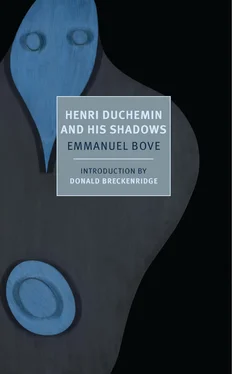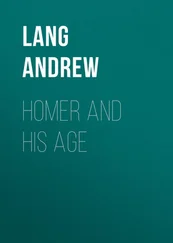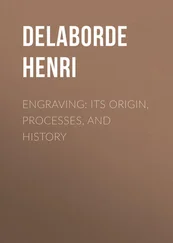But like a flock of birds, the angels flew off together toward a corner of the sky.
Henri Duchemin followed them with his eyes. He saw them growing ever smaller. Then, he turned his gaze toward the vases: they were no longer gilded.
He opened his eyes wide to see better. He awoke.
Henri Duchemin got up. The cold had chilled his body to the bone. Now he recognized the wallpaper and the sideboard to which he did not have the key. The light of dawn was coming through the curtains. The marble fireplace, the two chairs, the bed had never seemed so still.
Henri Duchemin picked up his hat and went out. For the first time, he saw flowerpots in the concierge’s window.
The street was empty. A frightening calm fell from the starless sky. With a few flaps of its wings, a bird slowly crossed the empty space.
Henri Duchemin walked straight ahead. On the horizon, wisps of smoke stood motionless against the gray sky. It was Christmas Day.
He vaguely remembered his dream. He recalled an old man who had said that in order to redeem oneself, one must suffer. But that did not concern him, for he had never done anyone any harm.
I prefer English gardens to French gardens. It’s not that order and harmony are distasteful to me, nor that the imitation of nature delights me. I simply like not knowing exactly where I am. English gardens are mysterious with their waterfalls and secret alleyways. Though you quickly end up where you began, for a few moments you have the wonderful illusion of being lost. Most of all, you don’t have to walk across vast open spaces where so many people look at you.
One hot August day I was strolling in the Parc Montsouris. Although it was noon, the sun was not in the middle of the sky. I could see it without moving my head, simply by raising my eyes.
The morning hours are the finest in the whole day. All those evening thoughts—too ambitious or too modest—have vanished. Night has made me a new being.
For me, the joys of the day never last beyond noon. That day, however, I was happy. I listened to the singing of the birds. I did not understand how some people could find it so appealing. Nothing in this chirping brought me any solace.
I was walking very slowly down a shaded alleyway looking for an isolated bench as close to the center of the park as possible, so that all around me an equal expanse of trees and lawn would separate me from the city.
The sky was blue. The air shimmered in the sunlight. A few insects that did not need to fear other, stronger insects hopped about on the grass. The intense, buzzing life of the fields and woods did not burst forth from this sheltered environment. The ground on which I walked reverberated. It did not absorb my footsteps the way country soil does.
I like giving bread to the birds. I do it because it’s a sign of a charitable soul. I’m even more commendable in that nothing attracts me to them. Like most people, I am fond of their grace and independence, but not to the extent that I find contentment throwing them crumbs.
As soon as I had located the bench I was looking for, I removed from my pocket the piece of bread I’d brought with me.
There were already a dozen or so birds around me when I noticed, a few yards away, a man watching me. I will not say, as some people would, that I felt him looking at me. That would be a lie. Yet I am sure that a woman in my position, seeing this stranger as I saw him then, that is, out of the corner of my eye without turning my head, would certainly have sworn she felt this gaze weighing on her.
Still, I continued tossing crumbs. I tossed them as close to me as possible. It’s always very satisfying to see birds come close. The trust they show in us enchants us and, although we know they would trust anyone, we want to believe they have gleaned our good intentions.
The stranger was still looking at me, and so I spoke to the birds. I even gave them nicknames. I wanted one of them to come take a crumb from my fingertips, which would have made it seem that those birds knew me, and that I often came to the park. Sadly, none of them did.
And as interested as I appeared to be in what I was doing, I didn’t stop thinking about the man watching me. He must have been saying to himself: “Some people are odd. Here is a poor wretch sharing the little he has with the birds. If nothing else, he must have a big heart. I’ve never seen a poor man do this.”
Surely he was telling himself this. I was conscious of my generosity. Since I had only a tiny piece of bread left, I divided it into crumbs. The stranger took a few steps toward me. The birds flew away. I turned to him humbly, my expression reproachful.
“Don’t be angry with me, monsieur,” he said gently. “The birds will return.”
Only then did I dare observe the stranger closely. He was an elderly man of average height, well-dressed. He had on pince-nez and those rubber boots that can be worn on either foot. He was looking at me with so much kindness that for a moment his pince-nez seemed to mist over.
“Do you come here often?”
“Yes, monsieur.”
For the first time in my life I was not embarrassed to meet someone. I was in such a perfect position to be liked that I could speak to anyone without being afraid.
“You must be fond of animals?”
“Very.”
I stood up, and without really thinking, simply to give myself something to do, I threw the bread in the grass where the birds had been.
“You’re a good soul,” he said after a moment of silence.
I did not answer. And yet these were not words that should have remained between two silences. No one ever complimented me before. No one ever said to me what other people hear so frequently. These fine words filled me with joy. I even felt I could have cried had I wanted to.
I continued to throw smaller and smaller crumbs. This stranger surely was very sensitive. He was embarrassed. When I looked at him, I had just enough time to see his eyes, for he lowered his head at almost the same moment.
“You know,” he said, pointing to the birds so I would not look at him, “they’ll come back.”
“But I don’t have any more bread.”
Now I have to confess something. When I said “But I don’t have any more bread,” there was a spiteful tone to my voice. We all have our weaknesses. No one is perfect. I said “But I don’t have any more bread” as if I were criticizing him for not having any, as if he should have foreseen I would run out, as if I wanted him to buy me some so I could go on giving it to the birds.
Fortunately, I am intelligent. Right away I understood what was petty in my attitude and I made up for it by saying in a natural voice:
“The birds have had enough for today.”
“Do you think so?”
The stranger was so kind he had not even noticed my little outburst.
We moved away. He was walking slowly, at his own pace. I matched my step to his. From time to time, he stopped to look at the sky.
“What a day!”
An immense joy filled me. I could tell that this stranger had a great love of simple things. He took interest in a thousand little trifles. He was, then, a man like me. Someone who does not know me well could think at first that I am hard to please and that this is why I am unhappy. No, all I ask for is a little friendship. I know the sign of great wisdom is not asking men to give what they cannot. One must take men as they are. I know this. I am wise. I ask only to take them as they are. But even this is denied me.
I walked next to the stranger with cautious steps, prepared to speed up or slow down, like those girls who proposition passersby.
I could hear each and every noise. The garden was almost deserted. Sometimes, across a lawn, we could see someone going by.
Читать дальше












